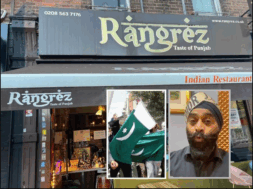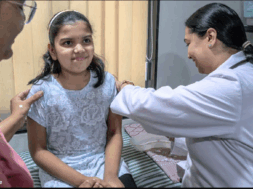
Roving Periscope: Amid war with Ukraine, Russia struggles against terror attacks
Virendra Pandit
New Delhi: Twenty-eight months into the inconclusive war in Ukraine, which has claimed hundreds of thousands of lives on both sides and millions of people fleeing homes amid wanton destruction, Russia is now forced to deal with another crisis: rising ethnic and religious tensions leading to terrorist attacks.
In the last three months alone, Russia has witnessed two major terror attacks. On Sunday, at least 19 people were killed and 25 injured in coordinated shootings at different places in Russia’s southernmost, Muslim-majority Dagestan Republic in the Caucasus Region, on the western shore of the Caspian Sea, the media reported on Monday.
In March, over 130 people were killed at a concert hall near Moscow in a terrorist attack claimed by ISIS-Khorasan (ISIS-K), challenging President Vladimir Putin’s reputation as a ‘tough man’, a leader who guarantees order across Russia.
These rising terror incidents stem from long-simmering ethnic tensions resurfacing, compounded both by drives to fill Russia’s military ranks as Putin’s war against Ukraine grinds on – and by the ongoing conflict in the Middle East.
In the latest attack, unidentified terrorists opened fire at multiple places of worship, including two synagogues, and a police traffic stop in two cities in Dagestan, killing at least 15 police officers and four civilians including a priest on Sunday.
Two urban synagogues – one in Derbent and the other in Makhachkala – were attacked, according to a statement from the Russian Jewish Congress (RJC).
Attackers “set the building on fire using Molotov cocktails” at the synagogue in Derbent while police and security guards were killed outside during the attack, the RJC said.
In Dagestan’s provincial capital Makhachkala, Russian state news agency TASS reported that a church security guard was killed in a shootout at Svyato-Uspenskiy Sobor, and 19 people had locked themselves inside the premises amid an attack. An attack was also reported at a police traffic post in Makhachkala.
There was no immediate claim of responsibility for the fresh attacks, but law enforcement agencies, probing the incidents, told TASS that the attackers were “adherents of an international terrorist organization.”
Dagestan is studded with more than 30 ethnic groups with distinct languages and is home to a variety of Islamic religious practices.
It has a minuscule Jewish population – Judaism is one of Dagestan’s long-established religions, practiced by communities of the Mountain Jews, who speak a form of Persian – but after centuries of coexistence with Muslim neighbors, that population has dwindled through emigration.
The Caucasus was mostly subsumed into the Russian empire in the nineteenth century and had a long history of resentment towards rule by Moscow, during Tsarist, Soviet, and post-Soviet times.
After the collapse of the Soviet Union in 1991, insurgents in neighboring Chechnya, which is also predominantly Islamic, fought two separatist wars for independence – which Russia labeled terrorism and responded with tactics that left much of the capital Grozny in ruins.
President Putin then installed his trusted dreaded warlord Ramzan Kadyrov in Chechnya who has since ruled with an iron fist.
In Dagestan, Russian security forces fought an Islamist insurgency in the mountainous region in the 2000s that spilled over from neighboring Chechnya, though attacks have become rarer in recent years, CNN reported.
But contemporary events have put the historically restless region once more on edge. More than 200 ethnic minority communities live in sparsely populated Russia, which spans 11 time zones with a population of only 144 million.
Some of these communities have been hit especially hard by Putin’s war in Ukraine with ethnic minorities disproportionately mobilized to face the horror of Moscow’s alleged human wave tactics.
In 2022 also, protests broke out in several ethnic minority regions against Putin’s mobilization orders, including in Dagestan, from where several Muslims had been taken away to join the armed forces against their wishes.
Israel’s ongoing war against Hamas after the brutal October 7 attacks also heightened tensions in the Caucasus, fueled by daily images of the destruction in Gaza.
President Putin tried to play a potential mediator in the Gaza War and earned some praise from Hamas. At the same time, his own army’s forcible enrolment of Muslims in the war against Ukraine enraged the minority community. In May, pro-Palestinian rioters stormed Dagestan’s Makhachkala Uytash Airport to protest against the landing of an Israeli aircraft, leading to clashes.
He has been trying to strike a delicate balance with the Muslims and has evolved a complex web of relationships in the Middle East. While he backs anti-Israeli Syrian President Bashar al-Assad and relies on another anti-Israeli Iran for a stockpile of drones to attack Ukraine, he is also friendly with Saudi Crown Prince Mohammed bin Salman, and Israeli Prime Minister Benjamin Netanyahu.
The recent terror attacks have brought the ethnic tensions in bold relief. After the ISIS-K attacks in March, four terrorists from the former Soviet Republic of Tajikistan were charged with terrorism.
Xenophobia is also on the rise across Russia, where President Putin is allegedly trying to rejuvenate the bygone Tsarist Empire which died in 1917. Migrants from the former Soviet Union’s Central Asian states — Tajikistan, Uzbekistan, Kyrgyzstan, Turkmenistan, and Kazakhstan — have traditionally been a valuable source of cheap labor across the country but are now suspected as potential terrorists and their sleeper cells.
President Putin is trying to paper over the simmering problem. In the aftermath of the March attack, he called for Russian unity.
“We must never forget that we are a multinational, multi-religious country. We must always treat our brothers, representatives of other faiths with respect, as we always do — Muslims, Jews, everyone,” he said.
But Sunday’s attack in Dagestan exposed deep fissures that continue to pockmark Russia’s border regions.














